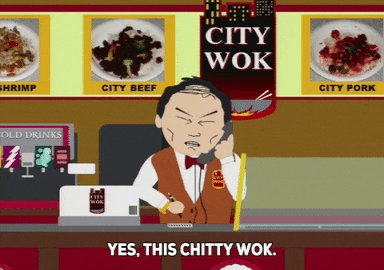Why everyone should work in food service
And what I learned from working at my parents' Chinese restaurant
I've mentioned before on podcasts that one of the greatest experiences of my life (though I didn’t know it at the time) was working in my parents' Chinese food restaurant.
Our restaurant was a counter serve, American-style Chinese food restaurant in Charlotte, North Carolina, close to the South Carolina border.
We had it for 13 years, from when I was 10-years-old until my parents sold it after I graduated from college.
It’s still standing today, though under different ownership.
At first, it was exciting. I was a fast learner and was operating the register pretty much from day one.
I’ll never forget the surprised look on an older customer’s face when 10-year-old me took his order and his cash.
Thank god he didn’t call child services—but it was me who enthusiastically manned the register, when no one was watching.
As I got into my teenage years, working at the restaurant was my part-time job. I suppose I was happy to earn my allowance and help out my parents, but it did cut into social activities and free time.
I worked Friday and Saturday nights until about 10:30 PM, and some Wednesday nights, too. There were also last minute requests to cover when someone called out.
After work, I would drive to my boyfriend’s or friend’s houses and hang out until my midnight curfew. The only time I could get out of my curfew was if I went to a midnight movie.
I never thought working in a restaurant would benefit me as much as it has as an adult. So much so that I think everyone, if given the chance, should work in food service, at a restaurant, or as a waiter or waitress, or even in a grocery store, at least once in their lives.
It’s not so much the cooking skills I acquired but more the skills I was able to apply in the real world at corporate jobs and in my own company.
Eventually, you’ll connect the dots along your career with the skills and lessons from working such jobs.
Here’s what working in a restaurant taught me
Responsibility, accountability, and humility
Your coworkers and customers are counting on you, and you're going to have to do things you don't want to do (like cleaning bathrooms, prepping and serving food, and working long hours).
You suck it up and do it, because it’s not all about you.
You learn to get off your high horse, roll up your sleeves and work together to get the job done and out on time.
Customer service skills
By meeting and serving so many people day after day, you’re forced to speak to just about everyone.
You encounter people from all walks of life. You strike conversations and find ways to relate and build a rapport. You learn how to handle problems and find solutions when people aren’t happy.
And you can eventually apply all of these skills to client-facing jobs later in life.
Stress management
You handle long queues, turn things around quickly, meet deadlines, and get hundreds of orders out the door, all while keeping a calm composure.
Sales skills
You learn about what you’re selling, and how to describe it in ways that make people want to buy it (like hand-rolled crab rangoons that are a perfect balance of cheese and crab meat, served piping hot and delicious with a spicy sweet sauce).
Patience and tolerance
You encounter ignorant and rude people: racists, bigots, idiots, people who are surprised by your perfect “American” accent, people who mock Chinese ones, and people who talk shit about your food—to your face.
You learn how to serve them and move on.
Time management
You learn how to work smart and efficiently to finish by a certain time.
If you're trying to make a movie by 11:45 p.m., and you still want to go home and change, then you'll figure out how to work efficiently and productively to be out of work by 10:30 p.m. or sooner.
You also learn what it means to leave your house to beat traffic and still show up to work on time, every time.
Quick mental math
Though nowadays most establishments are phasing out paper cash, remember, cash is always king.
The ability to count and visualize money and numbers quickly is priceless.
I once encountered a cashier who was scared shitless when I gave her additional change after she totaled the transaction in the register. If my total is $11.96 and I give you $12 and a penny, it’s so you can give me a nickel back.
During college when I cocktail waitressed at a gentleman’s club (yes) I’d also mentally calculate 20% of the pretax bill (protip: divide the amount by 5 and there’s your 20%), so I could gauge how generous or happy people were with my service.
Have any of you worked in, or grown up working in a restaurant, food service, or grocery store? What did you learn?
**
Until next time,
Shindy
On Instagram + TikTok
***
Did you enjoy this newsletter? Please like and share it!
Please like it by clicking on the heart at the very top or bottom of this post, or share it with you someone you think would find value in it. 🙏












